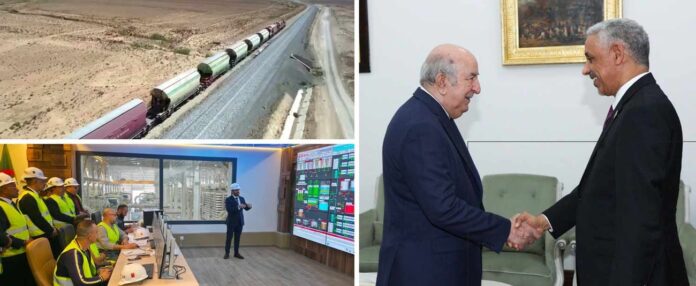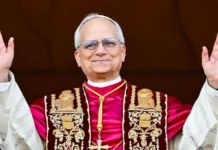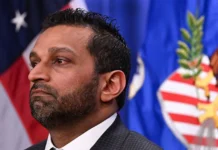ALGIERS, Algeria, The African Development Bank (AfDB) (www.AfDB.org) has officially been earmarked as Algeria’s international partner in the country’s renewed efforts to engage with external financing, marking a key milestone in the ongoing partnership between Algeria and the Bank Group.
During his official visit to Algeria on 16-17 November, Dr Sidi Ould Tah, President of the African Development Bank, expressed his deep gratitude to Algerian President Abdelmadjid Tebboune for this significant decision. Ould Tah emphasised that the move represented a strategic step forward in Algeria’s development and its relationship with the Bank Group.
As part of the 2025 Finance Law, Algeria has initiated its approach to external financing, focusing on large-scale projects of national importance. A central priority is the development of the Laghouat–Ghardaïa–El Meniaa railway line (495 km), with an estimated cost of $2.8 billion.
This rail line marks the first phase of a major Trans-Saharan Railway corridor, which will eventually stretch from the north of the country to Tamanrasset and beyond, connecting to Niger. This new logistics route will not only open up the southern regions of Algeria but will also provide a vital transport link for landlocked countries in the Sahel, facilitating access to essential resources and markets.
The project is part of Algeria’s broader national railway expansion plan, which aims to double the country’s railway network to 10,000 km by 2030, with a long-term goal of reaching 15,000 km. This expansion aligns with Algeria’s broader goal of modernising its infrastructure to reduce transportation costs, integrate isolated regions, and increase the domestic processing of valuable natural resources, including critical and industrial minerals.
Minister of Hydrocarbons and Mines, Mohamed Arkab, underscored the government’s commitment to adding value to the country’s raw materials. “We can no longer accept exporting our raw materials in their unprocessed state,” said Arkab.
Algeria has set ambitious targets to increase the local transformation of hydrocarbons from 30 percent to 60 percent by 2035, supported by a $60 billion investment plan running from 2025 to 2029. The country also aims to expand its capacity in petrochemicals, hydrogen, and other gas derivative industries, with a focus on upgrading fertilizer, oil, tire, and mineral processing.
In the mining sector, Algeria is positioning itself as a leader in the extraction and processing of critical minerals such as iron, zinc, gold, and rare earths. Many of these resources are located in the Saharan region, often huge distances from existing infrastructure. The Trans-Saharan Railway will provide the necessary logistical support to unlock the potential of these remote deposits, enabling local processing and improving access to markets in Algeria and neighbouring countries.
Ould Tah expressed strong support for Algeria’s ambitions, highlighting the alignment of the country’s industrial transformation with the African Development Bank’s strategic vision. “The localisation of value, industrialisation, and mineral sovereignty are key pillars of Africa’s future,” Ould Tah said, referencing a recent study by BloombergNEF, which indicated that Africa has a clear competitive advantage in producing battery precursors. He called for a coordinated approach across African nations to protect and sustainably enhance the continent’s critical mineral resources.
The visit also focused on Algeria’s efforts to strengthen energy and water security. The Bank President visited the “Fouka 2” seawater desalination plant, which is part of Algeria’s broader efforts to address water scarcity exacerbated by prolonged drought in the Mediterranean region.
The country currently operates 19 desalination plants. Five more units are set to come online by 2027, increasing desalination capacity to meet an impressive 60 percent of national water needs by 2030.
Algeria’s years-long expertise in liquefied petroleum gas (LPG) distribution was also highlighted as a model for the continent. The country provides 75 percent of its households with LPG, including cities in the southern desert region, through locally designed and built infrastructure. This experience is seen as a valuable contribution to the African Union’s clean energy transition efforts, with the African Development Bank supporting similar clean cooking initiatives across the continent.
Minister of the Interior, Local Authorities, and Transport, Saïd Sayoud, and Minister of Public Works and Basic Infrastructure, Abdelkader Djellaoui, highlighted Algeria’s exceptional capacity to manage large infrastructure projects. The country recently completed 950 km of railway in just 24 months using entirely domestic resources and expertise. This execution capacity is critical for supporting the ongoing development of key North-South corridors and strategic mining lines.
President Ould Tah praised Algeria’s ambitious vision and ability to execute high-quality projects, declaring: “The ambition of the Algerian government, the quality of its projects, and its national execution capacity make it a central partner for Africa’s transformation.”
By James Kisoo



















